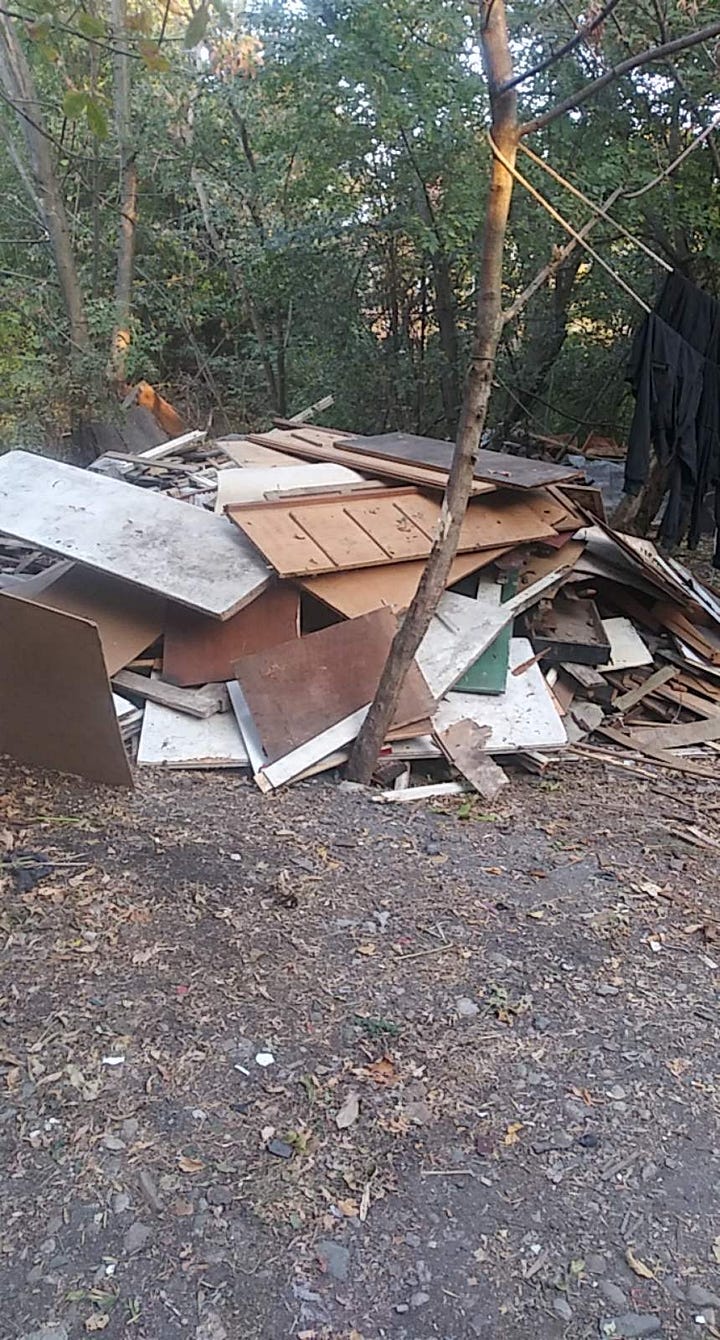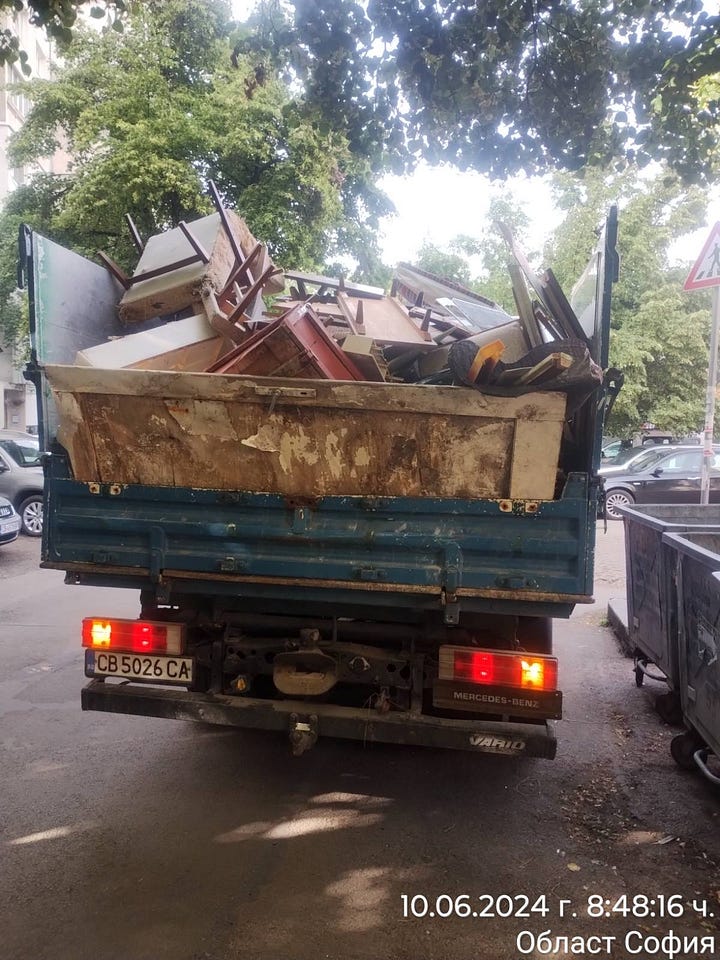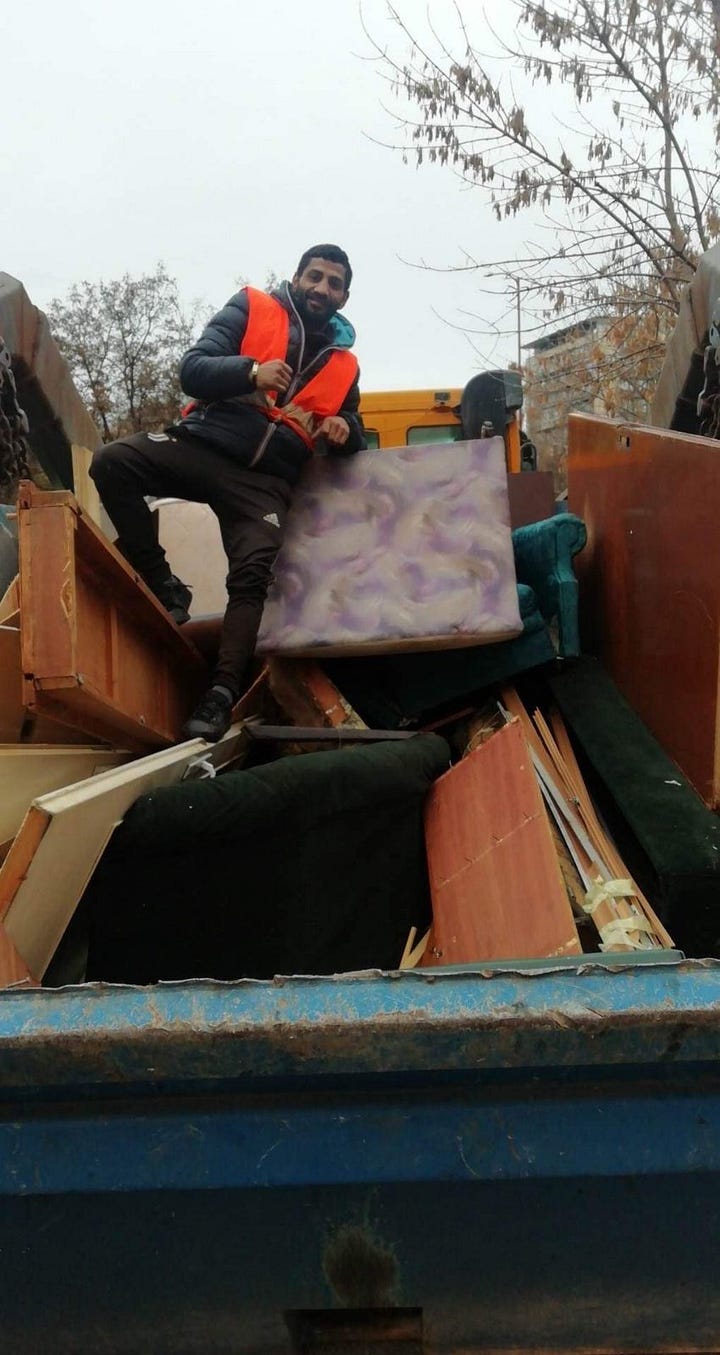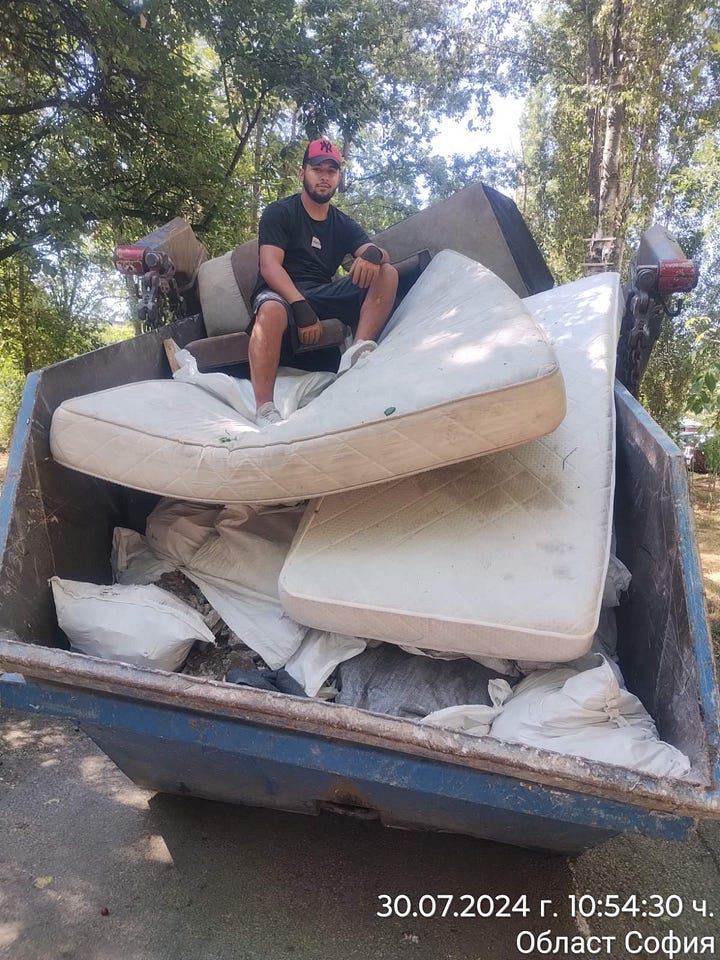Here in Bulgaria, mainstream society looks down on the minimum-wage street cleaning employment not only because it is “low class.” Even more so because it is done almost exclusive by the Roma minority and, according to most onlookers, it’s an easy job. Sweeping some streets, loading some trash into trucks, what’s the big deal?
“This is usually a dangerous section,” Pepi’s sister Todorka was telling Martina once over coffee, pointing to a small street next to the busy boulevard. “It’s on the way to the high school nearby.”
What Todorka left unsaid here was that teenage boys often harrass the street cleaners. This is why the proximity of the high school was something to be wary of.
“One time,” Todorka burst into laughter. She was about to tell a funny story, “three boys attacked me. They started swearing at me first, I swore back, one of them slapped me, the others grabbed me by the jacket. But Tzetzi (her 20-year-old son) was sweeping just around the corner. He ran towards them waving the shovel and fought them off like flies.” Todorka was howling with laughter. “He hit one with the shovel, swung for the other, and before you know it, they had run away.”
For Martina, this wasn’t very funny. She asked Todorka about the boys and this kind of attack in general. “It happens all the time,” Todorka shrugged it off like a non-issue, it happens so often so what’s the point of talking about it. “But we’re usually all nearby so when one person gets attacked, the others run to help.”
And then they tell it like a funny story - how they fought away the attackers with brooms and shovels.
It was again with Todorka when Martina’s eyes were opened a bit more to the reality of street cleaning.
Fighting the elements
At around 2:00 pm on a summer day, they were sitting in the blazing sun and waiting for someone to go and run an errand. Across the boulevard, the street cleaners, still in their orange vests, were gathering at the bus stop. Their shift had just ended and they were waiting for their bus.
“Ivan is not well,” Todorka said suddenly. Her eyes were pierced into one of the men in the group of her coworkers and relatives in orange across the street.
Martina looked at Ivan. He was sitting at the bus stop and was holding his head.
“Something’s wrong,” Todorka said. Ivan tried to stand up. He was swaying. Then he dropped.
“He fell,” Todorka jumped to jer feet. She started shouting across the boulevard as cars, buses, and trucks swung past. “Someone give him water! Give him water!”
People quickly gathered around him but he seemed unconscious. Soon, an ambulance came and after a quick check, the medics loaded him in and drove off. By this point, most of the Romani that were on the bus stop had crossed the boulevard and sharing a smoke with Todorka, telling her what happened. “A heat stroke,” Todorka translated for Martina and shook her head. “Happens all the time.”
Under the blazing sun or in snow blizzards, the street cleaners are out there with no protection. And no breaks. Every single minute they take to smoke a cigarette, have a coffee, hide in the shade, or just sit down and talk with each other for a bit - it’s stolen, not given. If they’re “caught”, they’re reprimanded and punished for slacking off.
What’s ironic here is that mainstream society only sees this: the stolen minutes. A very common complaint against the Romani is that they are lazy and one of the things given as evidence is that they don’t even sweep the streets, they smoke cigarettes and drink coffee under the shade.
What people don’t see is that these workers begin their day before the city wakes up, so that the streets are clear for the 8:00 am rush hour. Then they are forced to keep sweeping and keep cleaning, even if there is nothing left to sweep away. Or, even if there is no point in sweeping.
In autumn, when the leaves fall, the Romani are forced to work overtime in order to remove the leaves from the streets and sidewalks. It doesn’t matter if the wind is gushing in their faces, bringing waves and waves of more leaves. A worker can sweep a single street 10 times in a day, and by the time they go to the bus stop exhausted, after having stayed overtime, the street would still be covered in leaves. The same logic goes in winter. Shoveling snow as the snow falls and falls.
And in summer, under the blazing sun, the workers have to rip out strokes of grass from in between concrete pavement. They spend hours bending over, ripping grass with their bare hands. You can always tell when someone’s task that day was the grass. Their hands are always covered in small cuts and bruises.
There are smarter, modern ways to take care of all these things. Spraying the pavent so the grass falls off by itself. Using a specific blower for the leaves. There are ways to handle this without using human beings for mindless and dangerous work - but this costs money that the owners of the street cleaning companies don’t want to spend.
All this work is done with no boots, no gloves, no hats, no work clothes. The ones provided by the company are second-hand, ripped, and thin - designed for winter work. In fall and winter, everyone is out for themselves. People pull winter clothes from the garbage containers, cover themselves in plastic bags as protection against the rain and snow, and always, always shake from cold and exhaustion by the time their shift ends.
Back pain, severe colds, throbbing muscle aches, fainting, and debilitating exhaustion are a big part of the life of a street cleaner. But there’s more.
Mending wounds is part of the job description
Pepi’s eye almost got poked out a few months ago. Luckily, the metal pole that hit him in the head missed the eye and caught his forehead. He was bleeding all day but he was fine. He even laughed about how scared his supervisor got when he told her he’d go to the hospital. A workplace injury would mean a bearocratic hell for her, so she is very insistent on discouraging people to seek medical help when they get injured on the job.
Pepi’s not part of the group that sweeps the streets. That’s usually reserved for women. Men take care of loading the garbage from the containers into the trucks and - what Pepi does - loading “heavy objects” into the trucks. Heavy objects include washing machines, ovens, wardrobes, sofas, mattresses - big, voluminous objects that people leave half-broken by the garbage containers. When the street cleaners lift them, they sometimes fall apart in their arms, or pieces jump out. It was when Pepi and his co-worker were trying to lift an old oven that a metal pipe jumped out and hit his head.
A more recent incident was a piece of wood that quite literally stabbed him in the stomach as he was lifting a wardrobe. He managed to jump back quickly enough for it to only go a few centimeteres deep. Martina always gets upset when Pepi has close calls like this at work. And he always brushes her off with “Don’t worry, I’ve been doing this for years: I know how to protect myself.” Ideally, the trucks should have a claw for the heavy objects - but, like we said, the Romani street cleaners are not employed in the 21st century.




The men who lift the garbage containers don’t have it easier. Their trucks are also not equipped properly so the men have to lift the containers with their own muscles. Often the wheels of the containers are broken, so they can’t even be rolled to the truck.
But if you ask these men what they hate most about the job, they won’t say the backpain from all the mindless heavy lifting or all the things that stab them.
It’s what they have to step on.
“We don’t have proper work boots,” Pepi explains, “so shards of glass, wood, and all kinds of things keep getting in our shoes.”
All of these small and big injuries are a daily reality for the street cleaners. But they don’t seek medical help. They mend their wounds themselves, in the truck, on the way to or back from the garage where they dispose of the garbage.
One time, Martina was talking on the phone with Nada, one of the elderly women in the tribe. As they were ending the call, Nada said she’s about to sweep a section of the boulevard. Martina had seen so many of the women sweep the boulevard as buses and trucks woosh past them. One time, Martina saw Todorka from the bus. Todorka was sweeping and Martina drove past her so fast that Todorka couldn’t notice that Martina waved at her.
So as Nada was saying goodbye, Martina told her, “Be careful.”
Nada laughed. “Do you think this is my first time?”






